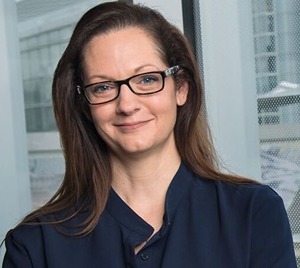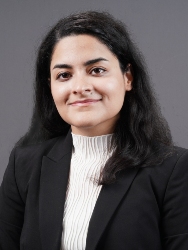International Women in Engineering Day: Q&A with Kari Clase and Upinder Kaur
The number of women in STEM fields, including engineering, has increased in recent decades, paving the way for a brighter, more representative future in the U.S. International Women in Engineering Day spotlights these trailblazing women and their achievements in various engineering disciplines. Founded by the Women’s Engineering Society in the U.K., the day is now recognized across the world on June 23. The day has the broader aim of inspiring future generations of women engineers, fostering diversity and inclusivity in the field.
Professor Kari Clase and Assistant Professor Upinder Kaur, from agricultural and biological engineering (ABE), speak about their experiences. They explain what drew them to engineering and the inspirations for their careers. They also share their hopes for a more representative field and offer advice to women interested in engineering.
 Professor Kari Clase, from agricultural and biological engineering (ABE)
Professor Kari Clase, from agricultural and biological engineering (ABE)  Assistant Professor Upinder Kaur, from agricultural and biological engineering (ABE)
Assistant Professor Upinder Kaur, from agricultural and biological engineering (ABE) What drew you to the engineering field?
Kari: My Ph.D. is in biochemistry, so I’m not an engineer by training. I bring scientific expertise to the field that helps guide me to develop and share authentic research experiences with our students in biological engineering. This way, they can build their skills and capabilities in science and then transcend the disciplinary boundaries between both biology and engineering, preparing them for tackling multidisciplinary problems and challenges beyond campus.
I never dreamed that I would be fortunate enough to contribute to a program that has an international impact. Purdue, the College of Agriculture and ABE have made that possible through their support of the Biotechnology Innovation and Regulatory Science Center.
Upinder: From a young age, I was fascinated by how things work. I loved building things, whether it was assembling intricate models or tinkering with various gadgets around the house. My passion for cars and bikes further fueled my interest in engineering. I was captivated by the mechanics and design that went into making these machines function. This passion led me to pursue a degree in engineering so that I could dive deeper into understanding and creating complex systems. My academic journey, coupled with hands-on projects and internships, solidified my commitment to this field. I eventually specialized in robotics, combining my love for building and innovation.
Who are your field-specific role models?
Kari: I’m drawn to biographies about people who challenge the traditional ways of thinking and approaches to helping people who are in the direst of circumstances and have the greatest need. These individuals are sometimes forgotten in our current system, such as those who struggle most for access to those basic things we take for granted and whose stories have been inspiring to me. For example, books by Tracy Kidder, like “Mountains Beyond Mountains,” about the life of Paul Farmer, had a tremendous impact on me. Another book that I will always remember is "The Coming Plague" by Laurie Garrett. I appreciate that I'm in an environment where I can partner with the Medical Missionaries of Mary and have a biblical-oriented mission. We bring and share technical expertise and local understanding of what people need, and it's a wonderful partnership. One of my strongest role models is Sister Zita Ekeocha, who we're working with right now. As a servant leader, she's inspirational to me.
Upinder: I draw inspiration from many trailblazers in engineering and robotics. Ada Lovelace, often considered the first computer programmer, has been a significant influence due to her pioneering work. Another role model is Hedy Lamarr, not only for her contributions to wireless technology but also for breaking the mold of what an inventor could be. I also look up to Amelia Earhart, a Purdue alumna, for her gutsy pursuit of what she loved without caring for the limitations that society imposed on her. My contemporary inspirations are Dr. Ayanna Howard and Dr. Anima Anand Kumar. Their work has been groundbreaking. All these women have shown immense perseverance and ingenuity, paving the way for future generations of female engineers, like me and my peers.
How do you hope women's representation in the engineering field will evolve in future years?
Kari: In a perfect world, we wouldn't even have to ask about representation. It would be a field that would reflect the people we are trying to reach. I dream of a world where the boundaries are blurred, where the representation is already there, and we don't have to strive for a quota anymore.
Upinder: I hope to see a substantial increase in women's representation in engineering, both in academia and industry, especially for women of color. It is crucial to foster an inclusive environment where women feel encouraged and supported to pursue and thrive in engineering careers, which is something I strive to do as a part of being an educator and researcher. The tech industry needs a substantial increase in women representation, as they bring a whole different perspective.
I hope for a future where gender diversity is the norm and women occupy more leadership and decision-making roles within the field. Mentorship programs, scholarships and initiatives that promote STEM education for girls from an early age are essential steps toward this goal. Additionally, highlighting the achievements of women engineers can inspire and empower the next generation.
What are some campus organizations/initiatives that you would recommend for women at Purdue who are interested in engineering?
Kari: I've had many students have positive experiences in Purdue’s chapter of the Society of Women Engineers. Recently, I've had two students who volunteered through SWE. They move forward in leadership positions, too. There are also multiple professional societies that students can get involved in beyond engineering, that are related to the sciences. It's an exciting time for research on bacteriophages and applying outcomes towards combatting antibiotic resistance. With that in mind, the American Society for Microbiology, American Association for the Advancement of Science and the American Chemical Society, are great. They offer professional development opportunities at multiple levels. I would also highly recommend participating in the upcoming Undergraduate Research Symposium.
Upinder: I highly recommend joining the Society of Women Engineers. SWE provides a supportive community, professional development opportunities and networking events that are invaluable for budding engineers. Another great initiative is the Women in Engineering Program (WIEP), which offers mentoring, outreach programs and resources specifically tailored to female engineering students.
Participating in engineering projects and competitions through organizations such as robotics clubs can provide practical experiences and foster a sense of camaraderie. I encourage all students to reach out to professors and graduate students to volunteer or participate in the various research labs at Purdue. We have cutting-edge research happening here on many frontiers and it is a great opportunity to explore and learn. It is also a great way to explore research and know if it’s a path that you’d like to consider for yourself. These organizations and initiatives not only enhance technical skills but also build a strong support network that is crucial for personal and professional growth.
Kari Clase is a professor of agricultural and biological engineering at Purdue University. She is the director of the Biotechnology Innovation and Regulatory Science Center (BIRS). The center’s mission is to improve access to quality essential medicines in sub-Saharan Africa by enhancing educational programs, research and pharmaceutical manufacturing. With faculty and student involvement, it works to strengthen regulatory systems in developing countries by identifying and improving core competencies, enhancing regulatory curricula, optimizing strengthening tools and implementing effective strategies. The capacity-building programs have received funding from the Merck Foundation, the Bill & Melinda Gates Foundation and the United Nations Industrial Development Organization. Through BIRS and ABE’s Sustainable Medicines in Africa program, she also collaborates with the Tanzania-based Medical Missionaries of Mary and Merck. Clase leads Purdue ABE’s Master of Science in Biotechnology Innovation and Regulatory Science. She received her Ph.D. in biochemistry and molecular biology from Purdue, and her bachelor’s in biochemistry from Old Dominion University. Her research focuses on biological engineering and cellular and molecular biology, working to enhance health and medicine on a global scale.
Upinder Kaur is an assistant professor of agricultural and biological engineering at Purdue University. She joined the university in 2023, after earning her Ph.D. from Purdue Polytechnic Institute, where she conducted research in the Collaborative Robotics Lab under the mentorship of Richard Voyles. Kaur’s current research reimagines cyber-physical systems (CPS) with robots as the mobile and dexterous edge, realizing a richer reactive interface between the physical and cyber worlds. Her thesis outlined a novel architecture of CPS with robots for precision animal agriculture, emphasizing care for individuals while improving welfare and productivity. Notably, she deployed robots in cows, to improve animal welfare and sustainability in precision dairy farming. In the future, she seeks to craft impactful systems that incorporate robots for real-world impact.






